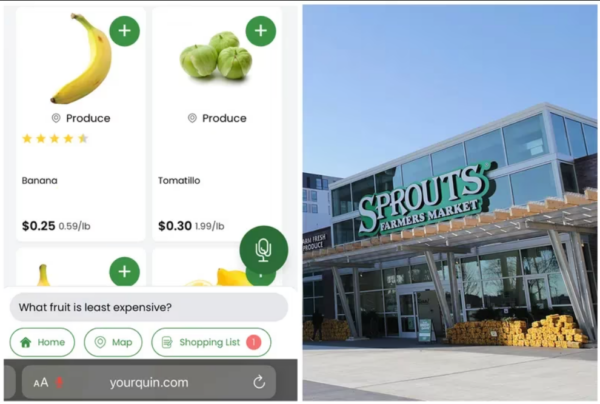As a kid, I thought grocery shopping was enjoyable and grown-up.
As an adult, I dread it.
A brief trip to the shop can grow into an hourlong, expensive one. I’m single, don’t have allergies, and don’t eat finicky. I can’t picture grocery shopping for a family with diverse constraints and preferences.
I was curious when a reader emailed me last month claiming they were “blown away” by a free AI tool at a local business. I knew of ChatGPT, but not consumer AI. From the reader’s description, this gadget, which I later learned was called Quin, seemed like it may ease shopping.
“I’m here to help find anything,” Quin says on purple-and-white signage inside Sprouts Farmers Market on South Broad Street.
Quin, a phone-based AI breakthrough, can answer spoken or typed questions about shop products, including nutrition and price, and assist consumers compare products. Items on a store map can be added to a digital shopping list in-store or at home.
Nasrin Mostafazadeh, co-founder of New York-based digital startup Verneek, said the moment was perfect to deploy their technology in grocery stores. In a COVID-19-aware world, grocery customers must balance inflation and healthy nutrition.
She said food shoppers may be the most ignored U.S. customers. Average Americans deal with food allergies, preferences, and dietary choices every day. They’re alone at grocery stores.”
Mostafazadeh said Quin is meant to help grocery personnel stock shelves, take inventory, and check out customers.
I tried Quin. Can AI simplify grocery shopping? Perhaps enjoyable?
Starting out
After entering the store, I opened my phone’s camera app and scanned the QR code on a Quin sign amid boxes of vegan muffins. A webpage with a green microphone button in the lower corner prompted me to ask a question. “What is the healthiest snack for kids under $5?” said the sign.
First question. Instead of answers, I got endless page refreshes. I thought, what a letdown.
My store service was poor.
Quin and I started once I connected to Sprouts guest WiFi and restarted the page.
Quin shopping
I wandered around the store staring at my phone, feeling like I was grocery shopping in the future, with a list of questions designed to test Quin rather than imitate a shopping list. I addressed Quin. It understood me above the store music, which impressed me.
I felt self-conscious because no other shoppers did the same during my hourlong tour. Security officers and store employees repeatedly asked me if I needed help, and I felt they believed I was shoplifting. I also hoped not to annoy shoppers.
Quin confidently answered most of my questions: What bread has the fewest carbs? What fruit is seasonal? What fresh vegetables cost under $5? The lowest-sodium frozen dinners are? Cheapest per-pound meat? Which ice cream is cheapest?

After each inquiry, it would provide a list of possibilities rated by price, unit price, or nutrient amount in a second or two.
Quin’s right.
Quin knew the store’s different dietary options. It listed many keto-friendly snacks, kosher foods, including gluten-free pastas.
It suggested cooking oils and wines for chicken and beef. It found honey and organic tampons, but I couldn’t find its preferred brand.
Quin advised me which eggs—including the kosher dark chocolate salted-caramel-filled variety—were the cheapest, which alerted me to low chicken egg supplies. After following Quin’s map to the egg section in the store’s back corner, I found that some of the store’s cheapest 12-pack kinds were sold out. Store-brand pasture-raised brown eggs, which cost $4.99, were still available.
Mostafazadeh said Quin updates automatically using merchant inventory data, but he plans to add crowdsourcing. That would allow shoppers like myself to notify Quin that an item is out of stock before the inventory list is updated.
Quin erred
Quin mistook peanut butter for a sauce when I inquired “What could I serve as a side with beef?” Chicken worked better, suggested Brussels sprouts. Each time, it also showed multiple side dishes, but they were generic and not protein-specific.
Quin rarely said, “I’m sorry, I can’t find what you’re looking for.” Rephrase or ask me anything else? Quin understood my remarks every time, but the question was too complicated.
Quin couldn’t find “eggs, milk, and bread” as a single item, but it could find each item individually.
“What can I make two people for dinner tonight for less than $10?” stumped Quin.
First, it requested rephrasing. I demanded a $10 supper recipe.

This time, it included a list of recipes with ingredients, retailer locations, and prices. “I couldn’t find items with your minimum price preference,” it said, but it gave me cook times.
Mostafazadeh said Quin may have been unable to hit the price target because it assesses the cost of all recipe items, including butter, milk, and spices that many buyers already have at home.
The ruling
Quin is nice after some adjustment. If you shop at Sprouts or another store that offers it and have a long shopping list or detest it like I do, try it.
If I had to do it again, I would create an account on yourquin.com and log before going to the store. I may even make a weekly grocery list at home to save time and reduce my expenses.
Instead of conversing on my phone in the pasta aisle, I could ask nutrition and price inquiries at home. Maybe one day everyone in the store will do that, making it less odd.

